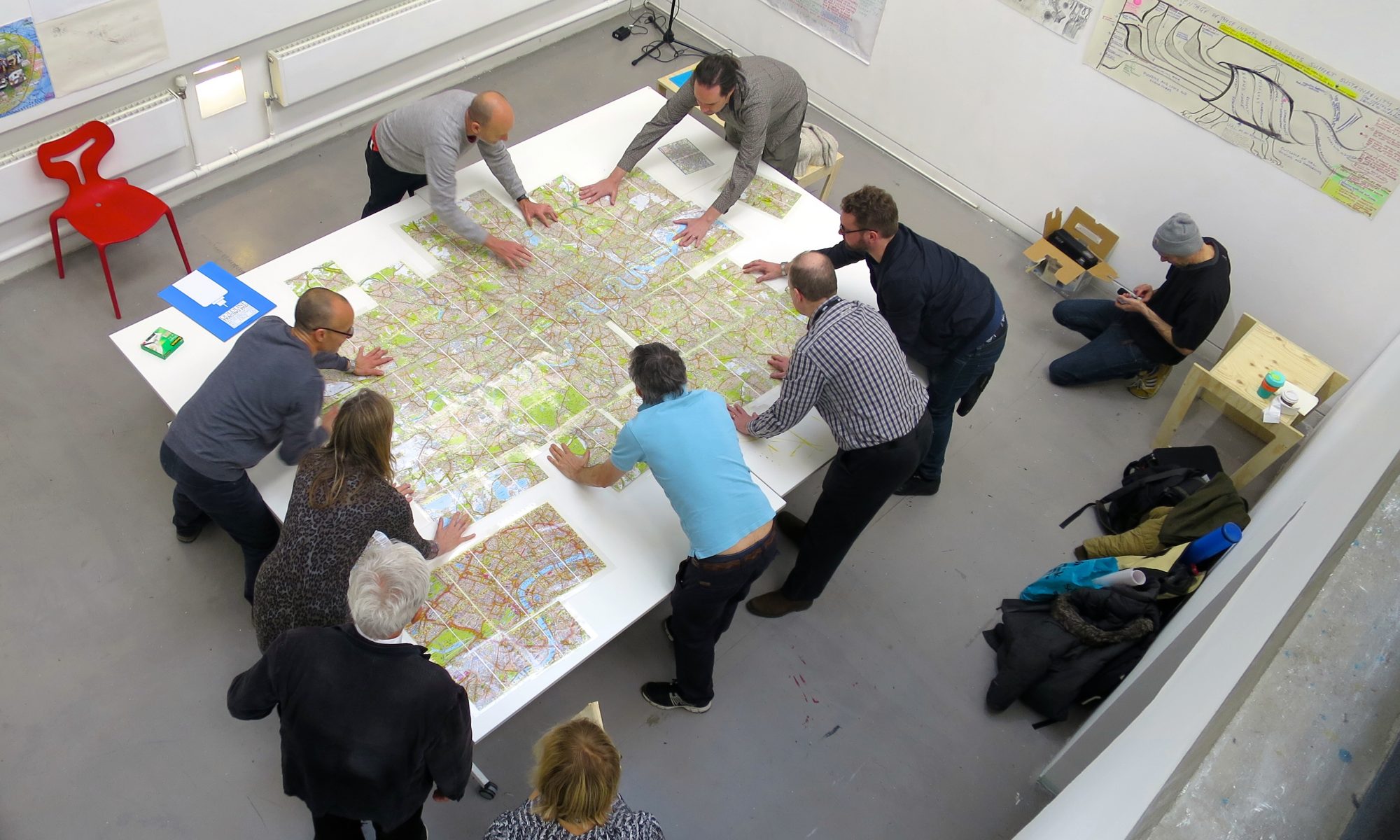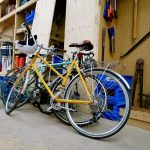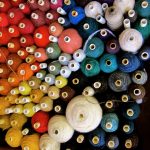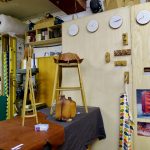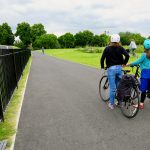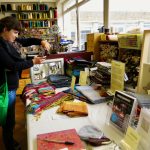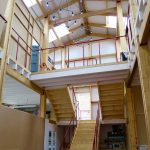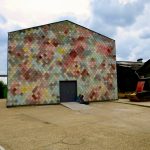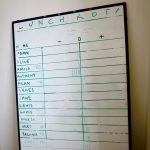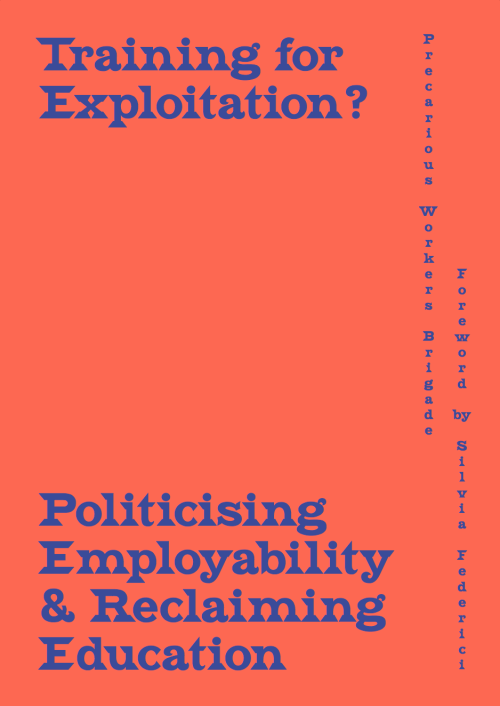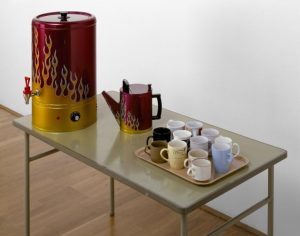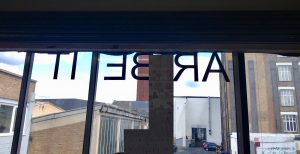
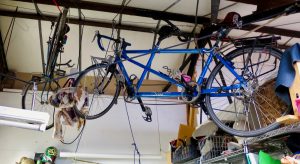
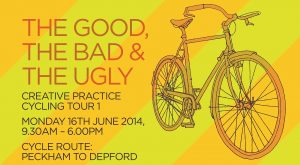
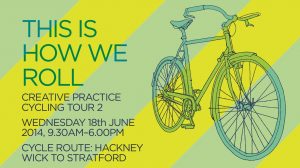
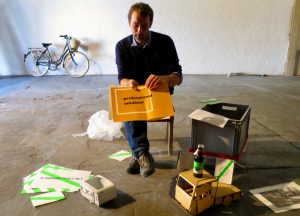
During two separate day-long tours, groups of UAL students met with artists, designers and others, who discussed experiences setting up successful and sustainable professional practices.
Creative Practice Cycling Tours | London | 16 & 18 June 2014
Tracking transitions over these cultural and artistic locations, participants on the tours were introduced to multifarious and unique ways of organising and structuring working processes, gaining detailed knowledge of the practical and conceptual skills required to make professional projects happen.
More specifically, the tours identified and mapped successful tactics for making together and inhabiting shared spaces, tracing strategies from one discipline to another, in order to provide a learning context in which participants could step outside the parameters of their normal frames of reference, learn from one another and cross-pollinate ideas.
The Good, The Bad & the Ugly
16 June 2014 | Peckham > Deptford | 9.30am – 18.00pm
With the title The Good, the Bad & the Ugly, the first tour explored the attributes needed to make it as a creative practitioner today, with guided insights from some of London’s most exciting creative practitioners working in south east London, who discussed the skills, values, behaviours and knowledge – good, bad, and at times problematic – that give them an edge.
From artists and architects to designers and cultural entrepreneurs, no matter what the creative discipline – each must make complex decisions about the commercial status and organisational structure of their work. For some, the development of an identity is key, while for others, a mastery of the art-funding system is essential.
Studio hosts
Cockpit Arts was founded in 1986 and now run social enterprise centres in (Central and South) London, which provide premises to over 170 small craft-based artists and studios. Maria Hatling, a designer supported by Cockpit Arts and Ellen O’Hara, then Head of Business Development discussed how the organisation ‘incubates’ and supports crafts practitioners in starting, growing and developing their businesses.
Claudia Firth is an artist and cultural theorist, currently based at Birkbeck University London. A member of Critical Waves Radio, she discussed her PhD research project, for which she is writing a short non-linear history of three moments of post-economic crisis (the 1970s, the 1930s and the present). Using Peter Weiss’ historical novel The Aesthetics of Resistance as a model, her research explores the specific conditions of political economy and how the terms history, aesthetics and resistance interact with and correspond to them.
Torti Hoare is a furniture designer who founded the Tortie Hoare Ltd in 2010. This studio creates exclusive, high quality handmade furniture. Each individual piece is carefully crafted with natural aesthetics and sustainability at the forefront of design-process, with the studio finding new ways of using natural materials.
NX Records is a collaboration between Matthew Herbert’s Accidental Records and the Department of Music, Goldsmiths, University of London. Participants on the tour were joined by Simon Deacon and Ruthie Woodward from the project, who discussed how each year NX Records creates a pop-up shop in a university owned building on New Cross High Street in South East London, with the aim of celebrating and supporting independent labels and artists.
THIS IS HOW WE ROLL
18 June 2014 | Hackney Wick > Stratford | 9.30am – 18.00pm
On the second tour, THIS IS HOW WE ROLL participants learnt about experimental approaches that use art, design, architecture and socially engaged practice to meet the needs of climate change.
For many artists today, issues of sustainability have become a central preoccupation in their work. Energy scarcity, climate damage and industrial consumerism are increasingly explored in art and design projects that test and trial new responses to ecological crises. Such practices implicitly question what it might take to move towards a post-carbon society; and it is these issues that will be investigated on the second tour.
In the newly formed post-Olympic landscape of east London, this tour tapped into cultural climate issues at a time when rampant cuts to public funding and precarity were writ large. By getting up close and personal we gained valuable understanding of some of the ways practitioners and arts organisations are making themselves more resilient through sensitive forms of practice taking energy scarcity, industrial consumerism and urban regeneration into account.
The second tour concluded with a ‘manifesto session’ led by artist and activist David Cross at Stour Space in Hackney Wick. Over tea and cake participants reflected on the day’s twists and turns – the sometimes surprising approaches to being environmentally conscious that surfaced. These reflections were developed into a set of guidelines that aim to highlight some of the skills, values, behaviours and knowledge that future-forward practitioners need to not only survive but also to thrive, in the rough and tumble world of cultural production.
Studio hosts
ASSEMBLE are a collective working across art, architecture and design to adapt and re-design reclaimed urban spaces. Embracing a DIY sensibility, their projects are conceived in tandem with the communities who use and inhabit these environments. They were nominated for the Turner Prize in 2015 shortly after the Creative Practice Cycling Tour visited them at Sugarhouse Studios on Stratford High Street. Assemble conceived and built Sugarhouse Studios (a studio and events space) in 2012, in collaboration with the London Legacy Development Corporation. This project uses the concept of a public building as a way of finding private practices (space for research, design and construction).
Richard Brown is Research Director at the Centre for London, an independent think tank and charity. Brown discussed his experiences as Strategy Director at the London Legacy Development Corporation, where he planned the transformation of London’s Olympic Park for the 2012 games and the regeneration of the surrounding area, including Hackney Wick. He also previously worked at the Greater London Authority, in the Architecture and Urbanism Unit amongst other positions, which promoted architectural and urban design excellence in other policies and projects in London.
Ross Butler is a ‘culturepreneur’ who founded Butler’s Gin in 2012. Discussing his experiences as a designer and brand developer, he introduced this unique brand, which adapts an originally Victorian recipe, connecting with London’s East End both historically and today, based in Hackney Wick.
Public works is a critical design practice set-up in 2004 and based in Queens Yard. As they discussed during a session in the Yard Theatre, as well as buildings, they create discursive events and undertake research, planning campaigns and urban strategies, as well as participatory art and architecture that aims to occupy the terrain in-between architecture, art, performance and activism.
